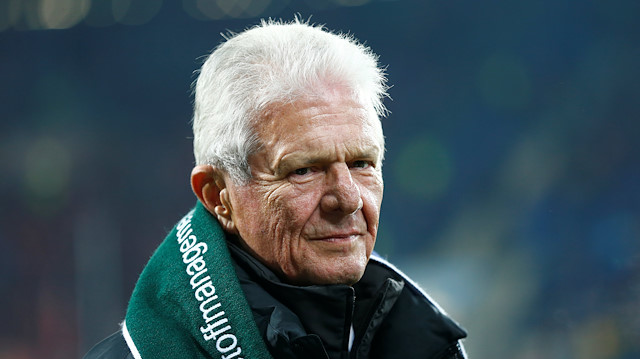
German supporters unveil their protest against businessmen and companies’ involvement in football with offensive bans
Bundesliga fans saw an extraordinary protest at the Rhein-Neckar-Arena with the Bayern Munich’s supporters unveiled an offensive banner to insult Hoffenheim’s majority owner Dietmar Hopp in the Week 24 game between Hoffenheim and Bayern Munich on Feb. 29.
In the 67th minute of the match, when the Bayern Munich were 6-0 up, the club's supporters displayed an insulting banner about Hopp.
Then the referee Christian Dingert stopped the match for a few minutes, and Bayern Munich players along with manager Hansi Flick requested their fans to remove the banner.
But fans lifted the offensive banner again in the 77th minute and the referee stopped the match one more time to take the players from both teams off the pitch.
After they returned to the pitch, both side's players just gave the ball to each other for the remaining of the match to protest the fans.
Bayern supporters’ reaction to Hoffenheim’s owner covered the papers' headlines throughout the week.
So, how did Hoff become one of the most controversial figures in German football and why did Bayern Munich fans target him?
The 79-year-old entrepreneur has been targeted since he helped Hoffenheim to jump from an amateur league to the Bundesliga by supporting them financially and investing an estimated €350 million ($400 million) into the club.
He currently owns 96% of the club and Hoffenheim had successful seasons over the past years under the control of Hopp.
Hoffenheim finished the league in third place in the 2017-18 season in Bundesliga and qualified for next year's UEFA Champions League for the first time in their history.
But, the club’s successful management and financial structure with Hopp’s administration have always been under criticism from some Bundesliga fans.
According to the “50 1” rule -- ownership model -- in Bundesliga, the supporters or members must own a majority of shares in a club but Hopp granted a special exception from this regulation and now a majority owner of Hoffenheim.
Therefore, Bundesliga fans believe Hopp’s Hoffenheim threat against the 50 1 rule with an artificial construct and believe that he is spending money to buy achievements and trophies on the pitch despite the club is lack of tradition with a small number of supporters. Most of Bundesliga clubs’ fans have been already protesting Hopp for this reason for a couple of years.
Two weeks ago, Borussia Dortmund supporters received a two-year suspension to attend matches away at Hoffenheim’s stadium over insulting chants against Hopp.
According to sportswriter Fatih Demireli -- editor-in-chief of Socrates Magazine --, the reaction of Bayern Munich fans to the Hoffenheim’s owner was a solidarity action against Dortmund supporters’ two-year ban for away matches to Hoffenheim.
"This punishment towards Dortmund supporters fueled the reactions from other fan groups. Bayern fans’ reaction in the Hoffenheim game to show their solidarity with Dortmund's supporters," Demireli told Anadolu Agency.
Demireli also believes the German Football Associated (DFB)’s punishments to supporter groups will create an opposite effect and that DFB would not react to racist abuses as much as they did in this incident.
Fans’ protests and insulting chants remained to protest against Hopp in the stadiums over the last weekend as Schalke 04 supporters unveiled an offensive banner while Wolfsburg fans insulted DFB.
Like Hoffenheim, Red Bull Leipzig is also regarded as one of the most disliked football clubs in Germany. An energy drink company Red Bull purchased the playing rights of fifth division club SSV Markranstadt in 2009.
Red Bull Leipzig advanced to Bundesliga within eight years and became title contenders in Germany’s top-division league over the few years following successful management and administration.
Although some fans see clubs like Hoffenheim as "plastic clubs", Demireli says there have been some good examples for the clubs owned by companies or businesspeople in German football.
"Hoffenheim and Red Bull Leipzig have been successful club models in recent years and they did not only invest in their senior teams but also spent money to improve their youth academies," he said.
"These clubs hire prominent sportsmen and managers like Ralf Rangnick. Those people know football very well and do not focus only on short-term success. In this way, they contribute to German football by helping to grow talented players and even managers."
Considered one of the most successful football figures in Bundesliga, Ralf Rangnick worked as a manager of Hoffenheim and Red Bull Leipzig in the past.
Demireli also stressed he is not personally against the clubs owned by companies or businesspeople like Red Bull Leipzig or Hoffenheim.
"I have no objection to these clubs if they invest in their youth academies -- but if you ask me as a fan, of course, I would like the traditional football clubs to be stronger, because the football is more beautiful with fans and their passion."
Despite these reactions and criticisms to Hopp, the German football would remain open to the investors, according to Demireli.
"Lars Windhorst invested around €200 million ($228 million) to Hertha Berlin and he is likely to continue to invest money for the Berlin club. Football is a very attractive sector for financial investors," he added.


